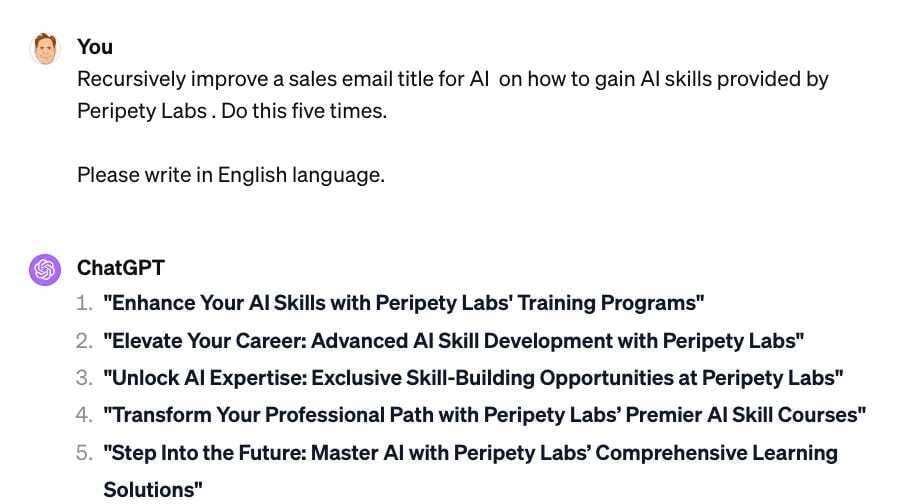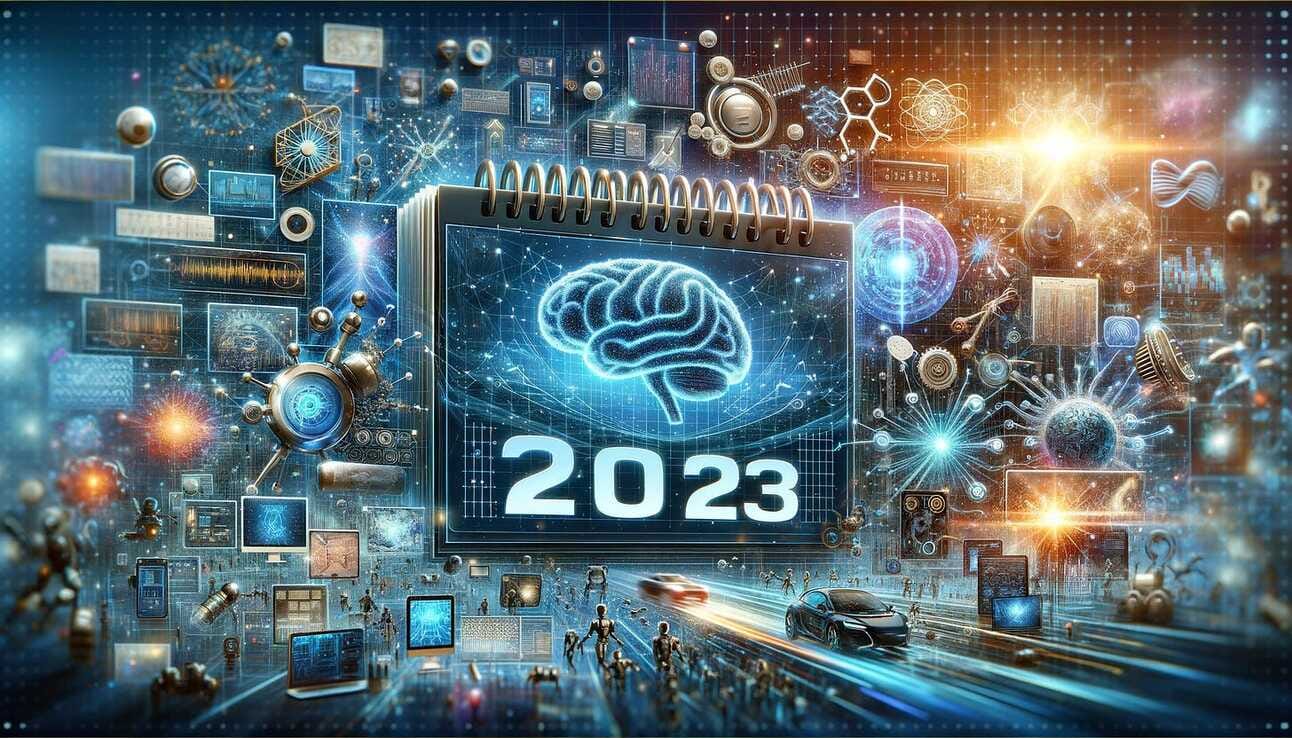
In 2023, the AI landscape was marked by significant advancements and events that shaped the industry. One of the most notable developments was the rise of advanced AI models. For instance, GPT-4 and Meta's LLAMA-2 showcased unprecedented language generation and understanding capabilities, setting new benchmarks in natural language processing. Grok, a conversational generative artificial intelligence chatbot, was developed by Elon Musk’s xAI as a response to the rise of OpenAI's ChatGPT, which Musk co-founded Grok was designed to provide witty responses and teach important life skills, distinguishing itself from conventional chatbots.
The AI economy also saw significant growth in 2023. The generative AI market was estimated to be worth $44.89 billion in 2023, with projections of it increasing to $207 billion On the low end, the size for the generative AI market at $44.89 billion in 2023 increasing to $207 billion in 2030. Areas of growth including personalized user experiences, creative content generation and personalized medical treatment plans.
Alternatively, Bloomberg Intelligence recently reported on the AI economy and found that the generative AI market is poised to grow at a 42% compound annual growth rate from $40 billion in 2022 to $1.3 trillion over the next ten years.
Furthermore, McKinsey's research estimated that generative AI could add the equivalent of $2.6 trillion to $4.4 trillion annually across various use cases, increasing the impact of all artificial intelligence by 15 to 40 percent
Also up to 40 percent of workers’ tasks today require understanding natural language. With the help of generative AI tools, jobs involving communication and documentation have significant automation potential. This technology could accelerate the transformation of work in areas such as education and office support.
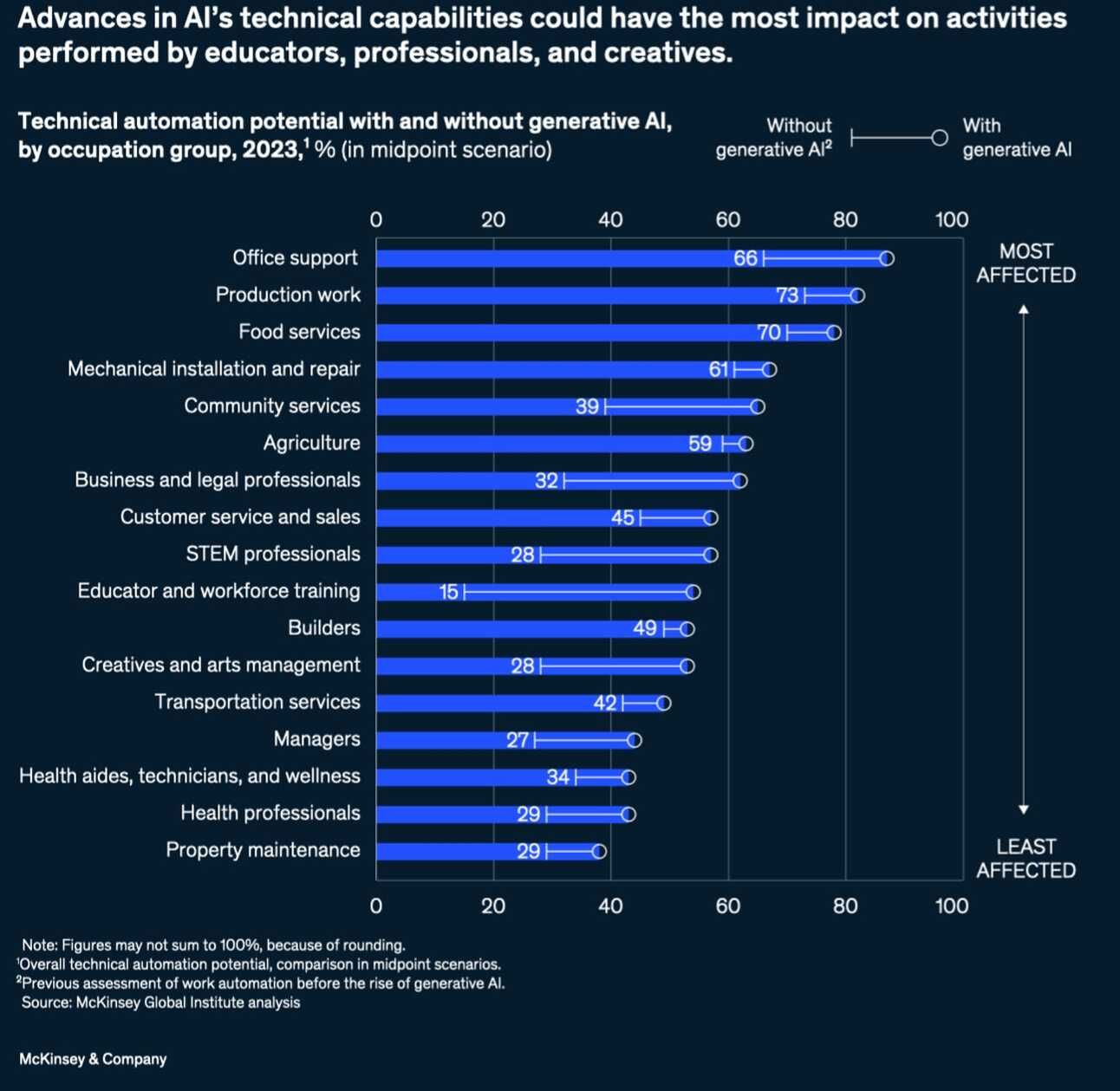
Let’s review how this year will shap
January - OpenAI Becomes the Fastest-Growing Consumer App in History
ChatGPT, the chatbot developed by OpenAI, achieved unprecedented growth, becoming the fastest-growing consumer application in history. Within just two months of its launch, ChatGPT reached an estimated 100 million monthly active users, with an average of about 13 million unique visitors per day in January, more than double the levels of December.
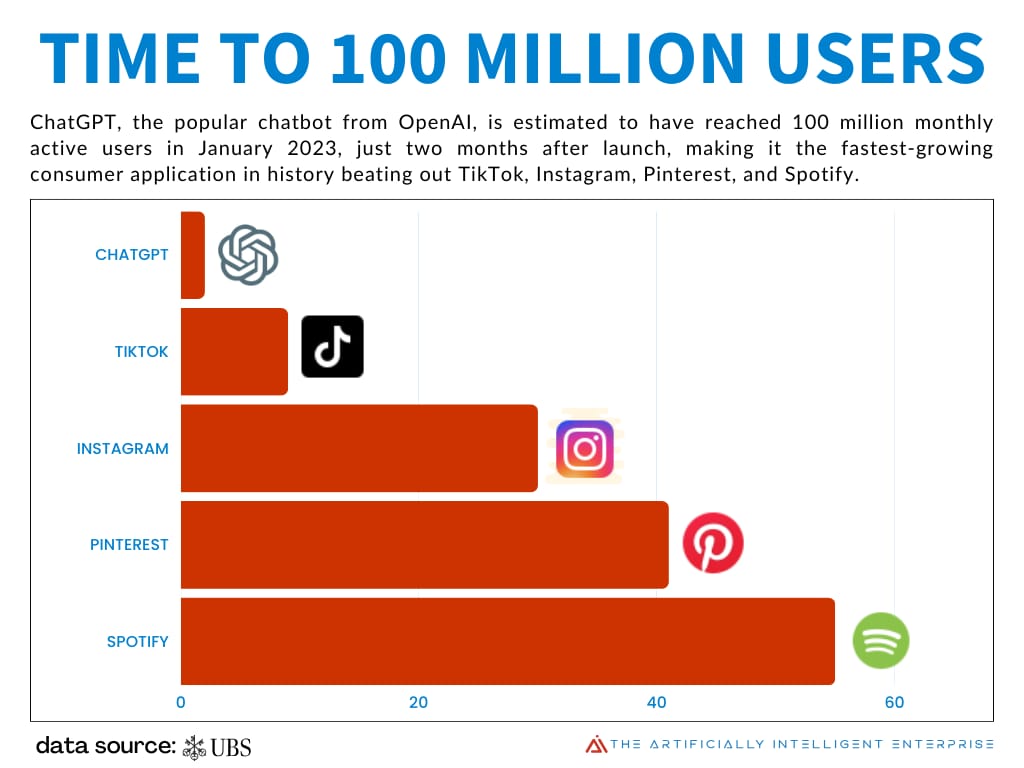
March - Open Letter To Slow Down AI Research
An open letter calling for a six-month "pause" in work on advanced artificial intelligence divided the tech industry in — not just between AI boosters and skeptics, but also between different factions of AI's critics.
The letter — initially signed by Elon Musk, Apple co-founder Steve Wozniak and other industry luminaries — urged "a stepping back from the dangerous race to ever-larger unpredictable black-box models with emergent capabilities."
It was addressed to all AI labs and urged them to halt the training of AI systems more powerful than GPT-4 for at least 6 months. It emphasizes the potential risks posed by AI systems with human-competitive intelligence and the need for careful planning and management in AI development. The letter sparked a debate within the AI community and beyond about the potential negative impacts of unrestricted AI research and the importance of addressing associated risks.
April - Godfather of AI Leaves Google Due to Concerns about AI
On April, Geoffrey Hinton, a pioneer in the field and one of the godfathers of AI and a respected voice in the industry, announced his departure from Google, where he had worked for over a decade. Hinton's decision to leave Google was driven by his desire to speak freely about the dangers of AI, a technology he had significantly contributed to developing. He expressed regret over his contribution to the field and voiced concerns about the potential misuse of AI, including the spread of misinformation and job displacement. Despite his departure, Google's chief scientist, Jeff Dean, expressed appreciation for Hinton's contributions and reaffirmed Google's commitment to a responsible approach to AI.
May - Hollywood Writer’s Strike Makes AI a Central Issue
The 2023 Hollywood Writers' strike was a result of failed negotiations between the Writers Guild of America (WGA) and the Alliance of Motion Picture and Television Producers (AMPTP). One of the key issues was the use of artificial intelligence (AI) in writers' rooms. The WGA proposed regulations to prevent AI from "writing" or changing material covered by the Minimum Basic Agreement, from being used as source material for adaptations, and to ensure that MBA material can't be used to train these programs. The strike lasted 148 days, making it one of the longest work stoppages in Hollywood history, and it ended with a tentative agreement between the WGA and major studios. The deal included guarantees that AI will not encroach on writers' credits and compensation. The strike had a significant impact on the entertainment industry, disrupting the production of TV shows and movies.
July - Meta’s Free Llama-2 LLM Starts to Rival OpenAI Models
Meta's LLAMA-2, a large language model (LLM), was a significant development due to its advanced capabilities and potential impact on various AI applications. Released by Meta (formerly Facebook), LLAMA-2 is a 65-billion-parameter model that outperformed other open-source chat models in testing. Microsoft also invested in OpenAI and integrated LLAMA-2 into its platforms, further highlighting its importance. The release of LLAMA-2 was part of Meta's commitment to open research and responsible AI innovation. The model's potential for generating text, having conversations, summarizing written material, and performing complex tasks such as solving math theorems or predicting protein structures made it a notable addition to the field of natural language processing.May - Hollywood Writers Strike
November - Sam Altman Gets Fired and Rehired as CEO of OpenAI
Sam Altman, the CEO and co-founder of OpenAI, was fired by the company's board, which led to a weekend of internal conflict and growing pressure from investors, particularly Microsoft. The lack of transparency surrounding his firing prompted an independent investigation by OpenAI's new board. However, a day after being fired, Altman was asked to return as CEO, and he accepted the offer, expressing his love for the company and its mission. The reasons for his initial firing remain undisclosed, and the situation has led to speculation and concerns about trust in the rapidly expanding technology field. Altman's return was met with support from employees and investors like Microsoft
December - EU Parliament Provisionally passes the EU AI Act
The European Union has finalized a groundbreaking AI regulation set to take effect in 2025. This development positions the EU as a pioneering global force in AI governance, reminiscent of its leadership in digital privacy.
The EU's approach classifies AI applications into four risk categories, with stricter regulations for higher-risk uses. This structure aims to balance innovation with risk management effectively.
Key Provisions
Prohibitions: The law bans specific AI applications, such as bulk facial image scraping and certain emotion recognition systems in work and educational environments.
Safety Exceptions: AI applications for safety purposes, like detecting drowsy drivers, are exempted.
Social Scoring and Facial Recognition: The law prohibits social scoring systems and restricts law enforcement's use of facial recognition.
Transparency and Compliance: AI developers must disclose training data summaries and manipulated media. High-risk AI applications, particularly in critical public services, require extensive reporting and human rights impact assessments.
Military Exemptions: EU nations, led by France, have secured exceptions for military and defense AI applications.
Contrasting the EU's stance, the U.S. and U.K. are adopting a comparatively lenient approach towards potential antitrust issues involving Microsoft and OpenAI, indicating diverse global perspectives on AI regulation.
2024 Gen AI goes from proof of concept to scale
As we look ahead to 2024, it's clear that the year is poised to be a transformative period for the scaling of artificial intelligence (AI) across various industries. After a year of successful pilots in 2023, including the groundbreaking success of ChatGPT, companies are now ready to invest in AI projects and harness the potential of this technology on a larger scale.
The year 2023 was marked by the successful launch and adoption of ChatGPT, a generative AI model that revolutionized the way businesses operate. This AI tool not only raised overall productivity but also democratized access to AI capabilities, helping even the least skilled to leverage its benefits. The success of ChatGPT has sparked an AI gold rush, with companies across the globe scrambling to integrate this technology into their operations.
In 2024, we can expect to see AI becoming deeply integrated into business functions. Advanced generative algorithms will reach new heights in capability, accessibility, and scalability, catalyzing widespread adoption. More advanced AI chips and dedicated hardware infrastructure will enable running sophisticated generative models at the edge, expanding smaller organizations' access to industrial-grade generative AI.
The technology sector is set to benefit significantly from the scaling of AI. Companies are using generative AI to analyze large volumes of data, surface non-obvious insights, and rapidly prototype new solutions, leading to innovative products and services at astonishing speeds.
The aviation industry is also set to benefit from AI scaling. For instance, AI systems like MIT CSAIL's Air-Guardian are enhancing safety by intervening during lapses in human pilot focus[2]. The Department of Defense has also successfully piloted a fighter jet using AI, demonstrating the potential of AI in aviation[6][9].
In the retail sector, grocers are planning to boost their digital grocery and AI budgets in 2024. They are optimistic about digital grocery sales next year, with 59% expecting to perform better in 2024 than in 2023.
However, as AI becomes more integrated into business functions, it's crucial to invest in ethical development and implementation. Without diligent governance and oversight, this exponentially powerful technology poses risks of exacerbating problems like bias, misinformation, and lack of accountability.
In conclusion, 2024 is set to be a landmark year for AI, with widespread adoption and scaling across various industries. The success of AI pilots in 2023, particularly the success of ChatGPT, has paved the way for this transformation. As companies increase their budget for AI projects, we can expect to see significant advancements and innovations in the coming year.
Prompt of the Week: Recursive Prompts
One technique for creating better results in ChatGPT is through recursive prompts, where the model's responses are used as prompts for subsequent responses. This approach can be leveraged in a business context to automate tasks, generate content, and more.
Understanding Recursive Prompts
Recursive prompts involve feeding ChatGPT prompts that come from responses to previous prompts in an automated or algorithmic fashion.
This can be likened to a conversation where each response builds on the previous one. The idea is to create a loop where the output of one prompt becomes the input for the next, allowing for continuous and dynamic conversation.
Recursive Prompts: Business Examples
Let's consider a business scenario where a company wants to generate a series of blog post ideas related to their product. The initial prompt could be: "Generate a blog post title about our new product's features." ChatGPT might respond with: "Exploring the Innovative Features of Our New Product." This response can then be used as a prompt for the next iteration, such as: "Generate a blog post title that expands on the innovative features of our new product." The process can be repeated as many times as needed, generating a series of interconnected blog post ideas.
Here are a couple of examples, of some simple prompts and the results. Note how each response builds on the previous prompt and they aren’t just random but derivatives fo the last answer.
Recursively improve a blog post title on how upskilling for AI will be a top priority for 2024 . Do this five times.
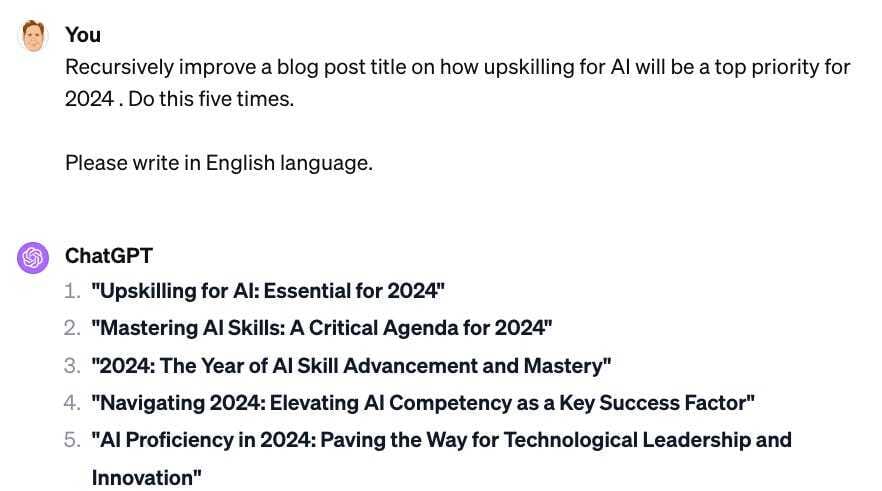
Recursively improve a sales email title for AI on how to gain AI skills provided by Peripety Labs . Do this five time
